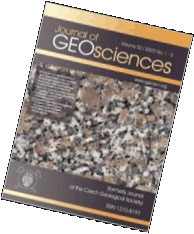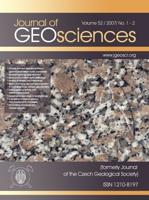 Export to Mendeley
Export to MendeleyOriginal paper
Intrusions of coherent volcanic rocks as reason, why eroded diatremes may form positive topography: an example of Bídnice diatreme, Czech Republic
Journal of Geosciences, volume 69 (2024), issue 3, 183 - 197
DOI: http://doi.org/10.3190/jgeosci.396
The Bídnice hill near Litoměřice, Czech Republic, has been recognized as a volcanic structure during a survey for a new railway connection between Prague and Dresden, where after several campaigns of combined geophysical survey, it has been concluded, that Bídnice is actually a deeply eroded peanut-shaped maar-diatreme volcano forming a positive morphology. The reason for the higher resistance of the disintegrated rock in the diatreme fill against the erosion when compared to surrounding country rocks was the main question of our presented research. While other positive-morphology diatremes in the region are mostly associated with high-viscosity differentiated alkaline rocks (namely phonolites), the Bídnice diatreme comprises intrusions of basic rock (SiO2 ca 38 wt. %), classified as olivine nephelinite. From the geophysical survey of the internal structure, comprising magnetometry and electrical resistivity tomography, a spoon-like subsurface intrusions of the olivine nephelinite were found. A smaller outcrop of the intrusive system penetrating the diatreme provided a K-Ar age of 27.06 ± 0.57 Ma (Oligocene). The results of the geophysical survey were then used to create a 3D geological model to better understand and interpret the geological setting. A system of coherent sills, even with a rather low thickness in the case of low-viscosity (ultra)mafic rocks, may be responsible for the reinforcement of the diatreme leading in slower erosion, and therefore resulting in the significant positive topography of eroded maar-diatreme volcano. In addition, sub-horizontal intrusions provide more homogeneous reinforcement of the diatreme against erosion compared to subvertical dykes, those would be exposed by the selective erosion in the form of small ridges.
Webdesign inspired by aTeo. Hosted at the server of the Institute of Petrology and Structural Geology, Charles University, Prague.
ISSN: 1803-1943 (online), 1802-6222 (print)
email: jgeosci(at)jgeosci.org


IF (WoS, 2024): 1.3
5 YEAR IF (WoS, 2024): 1.4
Policy: Open Access
ISSN: 1802-6222
E-ISSN: 1803-1943